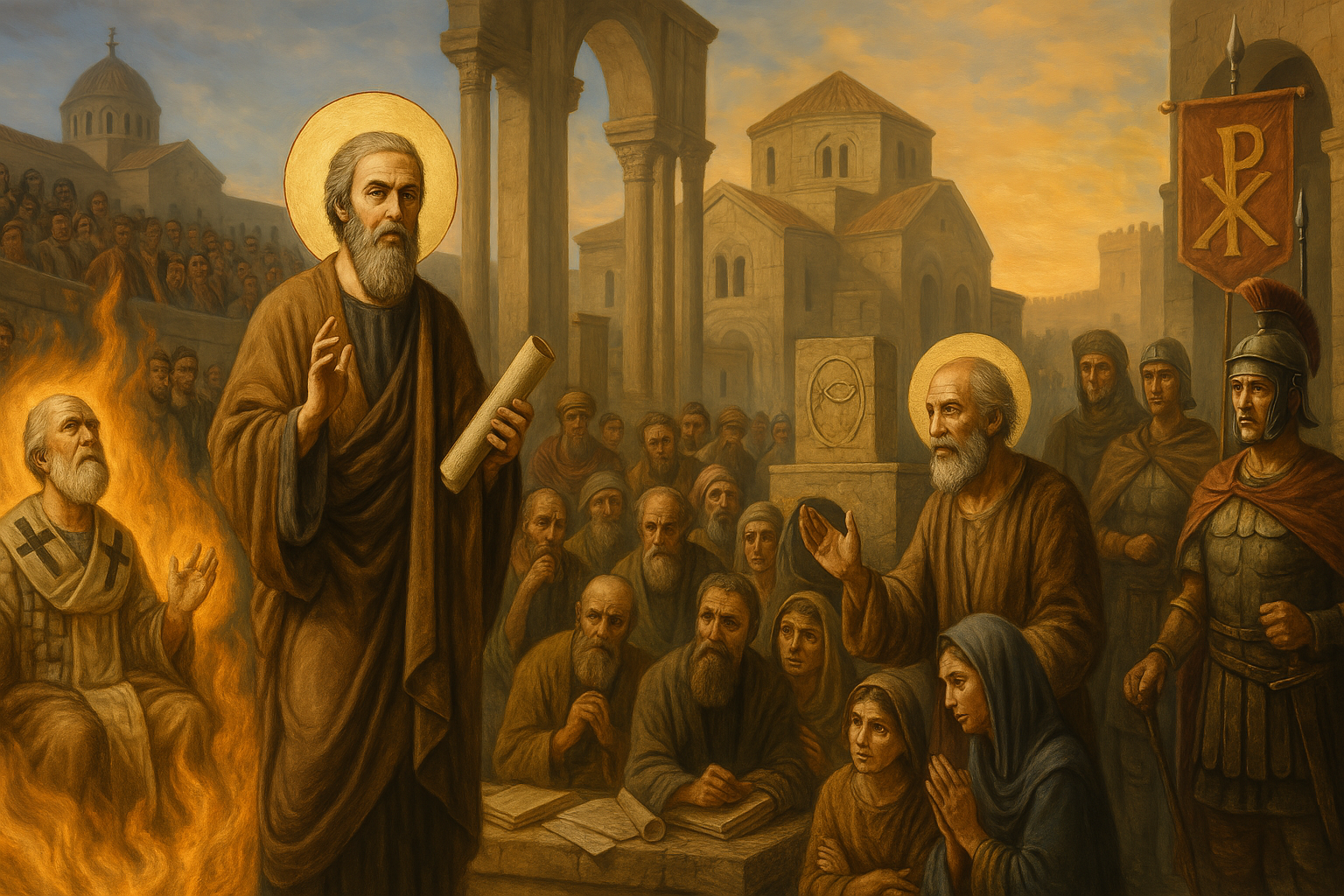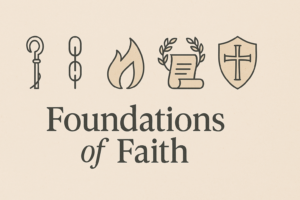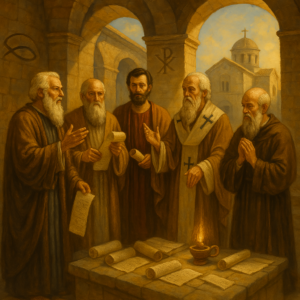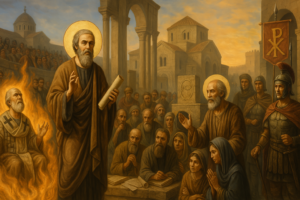Estimated reading time: 15 minutes
Key Takeaways
- The early church fathers were influential theologians who shaped foundational Christian beliefs.
- Their writings and teachings continue to impact Christianity today.
- Understanding their history helps in appreciating the development of Christian doctrine.
- Key figures include Clement of Rome, Ignatius of Antioch, Polycarp of Smyrna, Justin Martyr, and Irenaeus.
- Their teachings cover doctrines about God, Christology, salvation, and church practices.
The early church fathers were powerful and influential theologians and Christian leaders who shaped the foundations of Christianity during its formative years. These spiritual giants emerged in the period following the apostles, roughly spanning from the end of the 1st century to the 8th century AD. Their profound insights, writings, and teachings played a crucial role in developing early church fathers beliefs that continue to impact Christianity today.
As Christianity spread across the Roman Empire and beyond, these learned men defended the faith against critics, interpreted scripture, and helped establish the core doctrines that would define Christianity for centuries to come. Without the early church fathers, many aspects of Christian theology and practice we now take for granted might have developed very differently.
In this comprehensive guide, we’ll explore the fascinating history of these influential figures, examine their key writings, and discover how their wisdom continues to enlighten and guide Christians in the modern world. You’ll learn about individual church fathers, their most significant contributions, and how their teachings helped shape Christian doctrine throughout the ages.
Early Church Fathers History
The history of early church fathers spans several distinct periods, each marked by unique challenges and theological developments. This historical journey begins with the Apostolic era and continues through to Augustine, covering approximately seven centuries of Christian thought and leadership.
The Apostolic Fathers (Late 1st-Early 2nd Century)
The Apostolic Fathers represent the earliest generation of church leaders after the original apostles. These men, including Clement of Rome, Ignatius of Antioch, and Polycarp of Smyrna, had either direct contact with the apostles or were just one generation removed. Their writings provide our earliest glimpse into post-New Testament Christianity.
Clement of Rome wrote his famous letter to the Corinthians around 96 AD, dealing with church unity and proper conduct. Ignatius of Antioch, while being transported to Rome for execution, wrote seven letters that emphasize church hierarchy and the divinity of Christ. Polycarp, a disciple of the apostle John, continued spreading apostolic teachings until his martyrdom.
The Ante-Nicene Fathers (2nd-3rd Century)
The Ante-Nicene period saw Christianity facing serious external threats from Roman persecution and internal challenges from various heresies. Key figures from this era include Justin Martyr, Irenaeus of Lyons, Tertullian, and Origen.
These early church fathers focused on defending Christianity against pagan accusations, refuting heretical teachings, and developing a more systematic understanding of Christian doctrine. Their writings laid important theological groundwork that would be developed more fully in later centuries.
The Post-Nicene Fathers (4th-5th Century)
After the legalization of Christianity by Emperor Constantine and the pivotal Council of Nicaea in 325 AD, the Post-Nicene Fathers emerged. This golden age of patristic literature included towering figures like Athanasius of Alexandria, the Cappadocian Fathers (Basil the Great, Gregory of Nazianzus, and Gregory of Nyssa), John Chrysostom, Jerome, and Augustine of Hippo.
These church fathers from Clement of Rome to Augustine worked to clarify Christian doctrine, especially regarding the Trinity and the nature of Christ. They produced volumes of biblical commentaries, theological treatises, and pastoral writings that continue to influence Christian thought.
The historical context in which these fathers operated—facing persecution, political upheaval, and doctrinal controversies—shaped their writings and theological emphases. Their collective wisdom represents a treasure trove of spiritual insight that Christians of all traditions can learn from today.
Key Figures and Their Contributions
Apostolic Fathers’ Writings
The apostolic fathers’ writings played a critical role during Christianity’s initial stages. These documents, composed in the late first and early second centuries, provide a crucial bridge between the New Testament texts and later Christian literature.
The earliest of these writings include:
- The First Epistle of Clement: Written around 96 AD by Clement of Rome to the church in Corinth, this letter addresses church discord and emphasizes proper order and leadership.
- The Letters of Ignatius: Composed while Ignatius was being taken to Rome for execution (around 107-110 AD), these seven letters stress church unity, the authority of bishops, and the reality of Christ’s humanity and divinity.
- The Epistle of Polycarp to the Philippians: This pastoral letter offers practical moral guidance and warnings against false teachings.
- The Didache: Also called “The Teaching of the Twelve Apostles,” this early church manual provides instructions on Christian ethics, rituals, and church organization.
- The Shepherd of Hermas: A popular allegorical work focused on Christian morality and repentance.
These apostolic writings reveal how early Christians understood and applied apostolic teachings before the canon of the New Testament was fully established. They show the development of church structure, the beginnings of Christian liturgy, and early doctrinal formulations.
Justin Martyr Writings
Justin Martyr (c. 100-165 AD), a converted philosopher, became one of Christianity’s first and most important apologists. His writings demonstrate his skill in explaining and defending Christian doctrines to a Greco-Roman audience using philosophical concepts they would understand.
Justin’s major works include:
- First Apology: Addressed to Emperor Antoninus Pius, Justin defends Christians against common accusations and explains Christian beliefs and practices, including an early description of baptism and the Eucharist.
- Second Apology: A shorter work responding to specific cases of Christian persecution.
- Dialogue with Trypho: This extensive work records a debate between Justin and a Jewish scholar named Trypho, exploring the relationship between Judaism and Christianity and defending Christ as the Messiah promised in the Hebrew Scriptures.
Justin skillfully used Greek philosophical concepts to communicate Christian truths, arguing that Christianity was the fulfillment of the best insights of pagan philosophy. His writings show how early Christians began engaging intellectually with the surrounding culture while maintaining the distinctiveness of Christian revelation.
As a martyr who died for his faith under the reign of Marcus Aurelius, Justin’s personal example of courage and conviction reinforced the power of his written arguments.
Irenaeus Writings
Irenaeus of Lyons (c. 130-202 AD) emerged as a powerful defender of Christian orthodoxy against the challenge of Gnostic heresies. As bishop of Lyons in Gaul (modern France), Irenaeus wrote extensively against the various sects threatening the unity and doctrinal integrity of the early church.
His most significant work, “Against Heresies” (Adversus Haereses), provides a comprehensive refutation of Gnostic beliefs while presenting a positive exposition of Christian teaching. Irenaeus writings focus on:
- Defending Christian monotheism against Gnostic systems that posited multiple divine beings.
- Affirming the goodness of creation against Gnostic claims that matter was evil.
- Upholding the unity of the Old and New Testaments against those who rejected the Hebrew Scriptures.
- Establishing the authority of the four canonical gospels.
- Emphasizing the importance of apostolic succession as a safeguard for doctrinal truth.
Irenaeus developed the concept of “recapitulation,” teaching that Christ restored humanity by reversing the effects of Adam’s fall. He also highlighted the parallel between Eve and Mary, noting how Mary’s obedience helped reverse the effects of Eve’s disobedience.
His systematic approach to refuting heresy and articulating Christian doctrine made him one of the most influential theologians of the early church and earned him recognition as a “Father of Catholic theology.”
Ignatius of Antioch Writings
Ignatius of Antioch (c. 35-110 AD), the third bishop of Antioch, wrote seven remarkable letters while being transported to Rome for execution. These letters, composed under the shadow of his impending martyrdom, provide crucial insights into early Christian beliefs about church structure, the Eucharist, and Christology.
The seven authentic letters of Ignatius were addressed to:
- The Ephesians
- The Magnesians
- The Trallians
- The Romans
- The Philadelphians
- The Smyrnaeans
- Polycarp, Bishop of Smyrna
Key themes in Ignatius of Antioch writings include:
- Church hierarchy: Ignatius repeatedly emphasizes the importance of the threefold ministry of bishop, presbyters (priests), and deacons. He urges Christians to remain united under their bishop, writing, “Let no one do anything of concern to the Church without the bishop.”
- The divinity of Christ: Ignatius firmly defends Christ’s divine nature against docetic heretics who claimed Jesus only appeared to be human. He calls Jesus “God incarnate” and speaks of “the blood of God.”
- The Eucharist: Ignatius refers to the Eucharist as “the medicine of immortality” and insists on its central importance in Christian worship.
- Christian unity: Throughout his letters, Ignatius pleads for unity within the church, seeing division as the greatest threat to the Christian community.
- Martyrdom: Anticipating his own death, Ignatius expresses his desire to be “ground by the teeth of wild beasts” to become “pure bread of Christ.”
Ignatius’s writings reveal a church that was developing clear organizational structures and theological positions within a generation of the apostles. His insistence on episcopal authority would profoundly shape the development of church governance in subsequent centuries.
Polycarp of Smyrna Writings
Polycarp of Smyrna (c. 69-155 AD), a disciple of the apostle John and bishop of Smyrna, represents one of our most direct links to the apostolic age. Though his literary output was small compared to other church fathers, his influence was significant due to his direct connection to the apostles and his exemplary life of faith.
The main Polycarp of Smyrna writings that survive include:
- The Epistle to the Philippians: Polycarp’s only surviving complete work, this letter emphasizes righteous living and practical Christian ethics. It contains numerous quotations from New Testament writings, showing how the early church was already treating these texts as authoritative scripture.
- The Martyrdom of Polycarp: While not written by Polycarp himself, this account of his death is one of the earliest and most moving martyrdom accounts outside the New Testament. It describes how, at age 86, Polycarp faced death with remarkable courage, refusing to deny Christ even when offered freedom.
Polycarp’s writings are characterized by:
- Simple, practical instruction rather than complex theological arguments.
- Heavy reliance on Scripture, particularly the Pauline epistles.
- Emphasis on moral integrity and faithful obedience.
- Warnings against false teachings that denied Christ’s humanity or divinity.
- Encouragement to endure suffering for the faith.
As a bridge between the apostolic generation and later church leaders, Polycarp helped ensure the faithful transmission of apostolic teaching. When the heretic Marcion encountered him in Rome and asked, “Do you know me?” Polycarp famously replied, “I know you, the firstborn of Satan,” showing his unwavering commitment to orthodox Christian teaching.
His steadfast example in life and death made him a powerful witness to the truth of the gospel in the early second century.
Tertullian and Origen
Tertullian (c. 155-220 AD) and Origen (c. 185-254 AD) represent two of the most brilliant theological minds of the early third century, yet their approaches to Christian thought were strikingly different. Their contributions to the development of Trinitarian and Christological doctrines would shape Christian theology for centuries.
Tertullian
Born in Carthage (North Africa), Tertullian was trained as a lawyer and brought his legal precision to theological debates. Key contributions include:
- Creating Latin theological vocabulary that remains foundational to Western theology (terms like “Trinity,” “person,” and “substance”).
- Formulating the basic framework for Trinitarian doctrine with his phrase “one substance, three persons.”
- Defending the full humanity and divinity of Christ against various heresies.
- Writing apologetic works defending Christians against pagan accusations.
- Developing early ideas about original sin that influenced Augustine.
Origen
Origen, from Alexandria, Egypt, was perhaps the most prolific scholar of the early church. His contributions include:
- Enormous biblical scholarship, including the Hexapla (a six-column comparison of different versions of the Old Testament).
- Developing allegorical interpretation of Scripture, seeing deeper spiritual meanings beyond the literal text.
- Exploring the pre-existence of souls and the concept of universal salvation (ideas later rejected by the church).
- Defending Christianity against pagan criticisms in his work “Against Celsus.”
- Emphasizing the eternal generation of the Son from the Father.
While some of Origen’s speculative ideas were controversial and eventually condemned, his intellectual brilliance and devotion to Scripture made him enormously influential.
Both men represent different theological traditions (Latin West and Greek East) that would shape Christian thought in their respective regions. Despite their differences and controversial aspects of their theologies, both Tertullian and Origen made indispensable contributions to the development of Christian doctrine and biblical interpretation.
Catholic Church Fathers Writings
The Catholic Church Fathers writings comprise a vast treasury of theological reflection, biblical interpretation, and spiritual wisdom that continues to shape Catholic doctrine and practice today. While all early church fathers are important to Catholicism, several stand out for their particularly profound influence on Catholic theology.
Augustine of Hippo (354-430 AD)
Augustine’s voluminous writings address virtually every aspect of Christian theology:
- In “The Confessions,” he combines autobiography with profound spiritual insights.
- “The City of God” offers a comprehensive Christian philosophy of history.
- His works on grace and free will shaped Catholic understanding of salvation.
- His trinitarian theology remains foundational for Catholic thought.
Jerome (347-420 AD)
Jerome’s most significant contribution was translating the Bible into Latin (the Vulgate), which became the standard biblical text for over a thousand years. He also wrote biblical commentaries and letters addressing various theological and moral questions.
Ambrose of Milan (340-397 AD)
As bishop of Milan, Ambrose:
- Developed Christian ethics based on biblical principles.
- Wrote influential works on the sacraments and Christian virtues.
- Stood firm against imperial interference in church affairs.
- Mentored Augustine and influenced his conversion.
Gregory the Great (540-604 AD)
As pope, Gregory:
- Reformed church administration and liturgy.
- Wrote “Pastoral Care,” a handbook for clergy that remained influential for centuries.
- Developed the theology of purgatory.
- Sent missionaries to evangelize England.
John Chrysostom (347-407 AD)
Known as “Golden Mouth” for his eloquent preaching:
- Produced extensive homilies on Scripture that remain models of biblical interpretation.
- Emphasized practical Christian living and social justice.
- Wrote important works on the priesthood and the Eucharist.
The Catholic Church draws heavily from these fathers’ writings on topics such as:
- The real presence of Christ in the Eucharist.
- The authority of the Pope as successor to Peter.
- The veneration of saints and Mary.
- The seven sacraments.
- The role of tradition alongside Scripture.
These Catholic Church Fathers writings established theological foundations that continue to guide Catholic teaching and spirituality in the modern age. Their work represents the living development of doctrine that Catholics see as guided by the Holy Spirit throughout the church’s history.
Teachings and Beliefs
Early Church Fathers Beliefs
The early church fathers beliefs formed the bedrock of Christian theology that would develop over subsequent centuries. Despite some differences in emphasis and expression, these early theologians shared core convictions that defined orthodox Christianity.
Doctrine of God
The church fathers affirmed:
- Monotheism: There is only one true God.
- God as Creator: The universe was created by God out of nothing (ex nihilo).
- Divine attributes: God is eternal, omnipotent, omniscient, and omnipresent.
Christology
Regarding Christ, they taught:
- The full deity of Christ as the eternal Son of God.
- The complete humanity of Jesus (against Docetism, which claimed Jesus only appeared human).
- The virgin birth as affirmed in the Gospels.
- The literal resurrection of Jesus in a glorified physical body.
- Christ’s role as the unique mediator between God and humanity.
Holy Spirit
Early beliefs about the Holy Spirit included:
- Affirmation of the Spirit’s divinity (developed more fully after the Council of Nicaea).
- Recognition of the Spirit’s work in sanctification.
- The Spirit’s role in inspiring Scripture.
- The bestowal of spiritual gifts to the church.
Salvation
On salvation, early church fathers believed:
- Salvation comes through faith in Christ.
- Baptism is necessary for the forgiveness of sins.
- Good works demonstrate genuine faith.
- Grace is essential for spiritual transformation.
- The church is the context for salvific growth.
Humanity and Sin
Regarding human nature, they taught:
- Humans are created in God’s image.
- The fall of humanity through Adam’s sin affected all people.
- Sin corrupts human nature but doesn’t completely destroy God’s image.
- Redemption restores what was damaged by sin.
Eschatology
On final things, they affirmed:
- Christ will return bodily to judge the living and the dead.
- The resurrection of the dead.
- Eternal reward for the righteous and punishment for the wicked.
- The ultimate renewal of creation.
These fundamental early church fathers beliefs were expressed and developed in various ways by different fathers, but they represent the core convictions that distinguished orthodox Christianity from competing philosophical systems and heretical movements. Their theological reflections provided the foundation upon which the great creeds and later theological traditions would build.
Teachings of the Early Church Fathers
The teachings of the early church fathers covered a vast range of topics essential to Christian faith and practice. These teachers shaped not only what Christians believed but how they worshiped, lived, and organized their communities.
Scripture and Tradition
The fathers taught that:
- Scripture is divinely inspired and authoritative.
- The rule of faith (later called apostolic tradition) guides proper interpretation.
- The church is the guardian and interpreter of Scripture.
- Scripture should be read both literally and spiritually.
Sacramental Theology
On sacraments, early church fathers taught:
- Baptism provides forgiveness of sins and incorporation into Christ’s body.
- The Eucharist is truly Christ’s body and blood (though they used different language to express this).
- Confirmation imparts the gifts of the Holy Spirit.
- Ordination confers sacred authority for ministry.
Church Order and Unity
Regarding church structure, they emphasized:
- The threefold ministry of bishops, priests, and deacons.
- Apostolic succession as guaranteeing authentic teaching.
- The importance of church unity and the danger of schism.
- The special role of the Roman church in maintaining unity.
Christian Ethics
The fathers’ moral teachings included:
- The sanctity of human life (opposing abortion, infanticide, and gladiatorial games).
- Sexual ethics emphasizing marital fidelity and chastity.
- Care for the poor and vulnerable as essential to Christian life.
- Honesty in business and personal dealings.
Prayer and Worship
On spiritual practices, they taught:
- Regular communal worship, especially on Sunday.
- Daily prayer using the Psalms and the Lord’s Prayer.
- Fasting as spiritual discipline.
- The value of virginity and ascetic practices.
Creation and Providence
The fathers affirmed:
- The goodness of God’s material creation (against Gnostic and Manichaean views).
- God’s ongoing providential care for the world.
- The ultimate restoration of creation.
- Humans as stewards of the created order.
The teachings of the early church fathers represent the first systematic attempts to articulate and defend Christian doctrine. Though they sometimes differed in their approaches and emphases, they shared a common commitment to preserving and developing the apostolic faith. Their teachings provided the theological foundation that would be clarified and elaborated in subsequent centuries of Christian thought.
Frequently Asked Questions
Q: Who were the early church fathers?
A: The early church fathers were influential theologians and leaders from the late 1st to 8th centuries who shaped the foundations of Christian doctrine and practice.
Q: Why are their writings important?
A: Their writings provide insight into the early interpretations of Christian teachings, helping us understand the development of key doctrines and practices.
Q: How did they influence modern Christianity?
A: Their theological reflections laid the groundwork for many beliefs held in modern Christianity, influencing doctrines on the Trinity, Christology, salvation, and more.
Q: What challenges did they face?
A: They faced external threats like Roman persecution and internal challenges like heresies, which influenced their writings and teachings.
Q: Where can I read their works?
A: Many of their writings are available online or in published collections, providing valuable resources for those wanting to delve deeper into early Christian thought.




